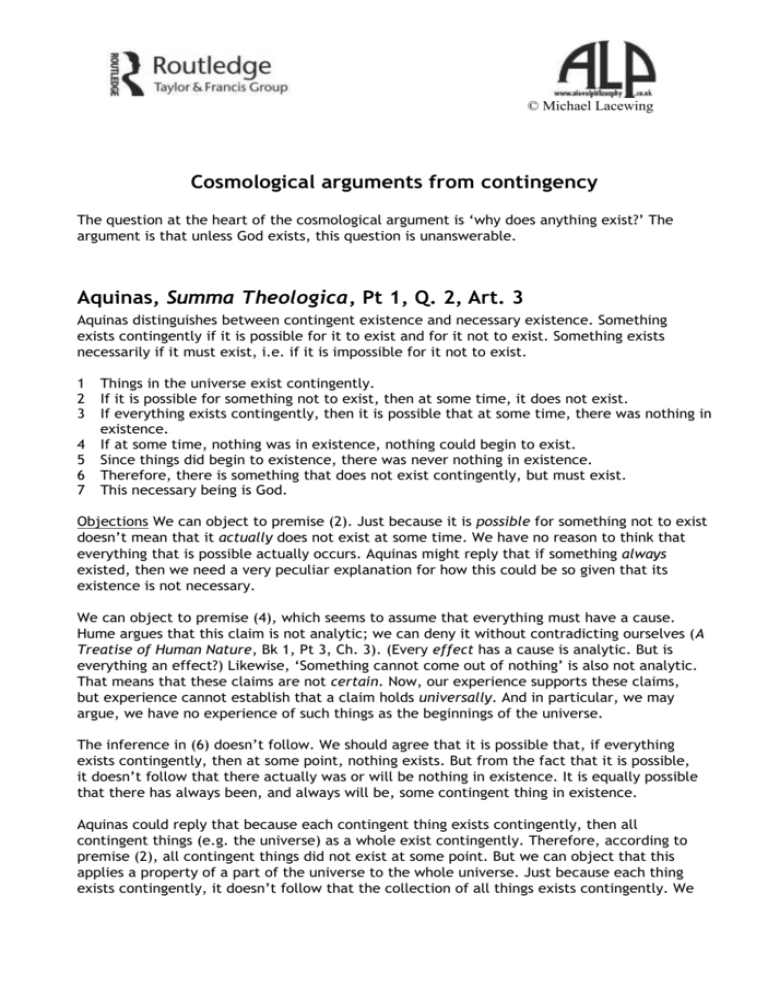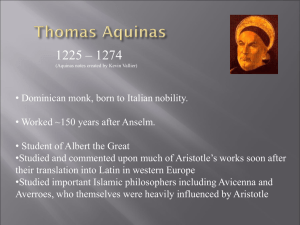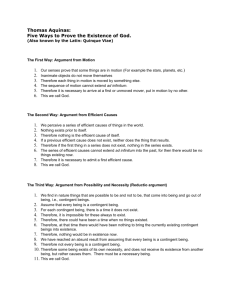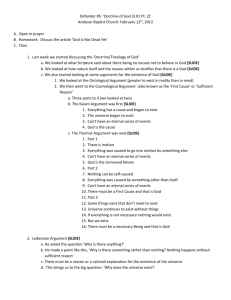Microsoft Word - Cosmological arguments from contingencyx
advertisement

© Michael Lacewing Cosmological arguments from contingency The question at the heart of the cosmological argument is ‘why does anything exist?’ The argument is that unless God exists, this question is unanswerable. Aquinas, Summa Theologica, Pt 1, Q. 2, Art. 3 Aquinas distinguishes between contingent existence and necessary existence. Something exists contingently if it is possible for it to exist and for it not to exist. Something exists necessarily if it must exist, i.e. if it is impossible for it not to exist. 1 2 3 4 5 6 7 Things in the universe exist contingently. If it is possible for something not to exist, then at some time, it does not exist. If everything exists contingently, then it is possible that at some time, there was nothing in existence. If at some time, nothing was in existence, nothing could begin to exist. Since things did begin to existence, there was never nothing in existence. Therefore, there is something that does not exist contingently, but must exist. This necessary being is God. Objections We can object to premise (2). Just because it is possible for something not to exist doesn’t mean that it actually does not exist at some time. We have no reason to think that everything that is possible actually occurs. Aquinas might reply that if something always existed, then we need a very peculiar explanation for how this could be so given that its existence is not necessary. We can object to premise (4), which seems to assume that everything must have a cause. Hume argues that this claim is not analytic; we can deny it without contradicting ourselves (A Treatise of Human Nature, Bk 1, Pt 3, Ch. 3). (Every effect has a cause is analytic. But is everything an effect?) Likewise, ‘Something cannot come out of nothing’ is also not analytic. That means that these claims are not certain. Now, our experience supports these claims, but experience cannot establish that a claim holds universally. And in particular, we may argue, we have no experience of such things as the beginnings of the universe. The inference in (6) doesn’t follow. We should agree that it is possible that, if everything exists contingently, then at some point, nothing exists. But from the fact that it is possible, it doesn’t follow that there actually was or will be nothing in existence. It is equally possible that there has always been, and always will be, some contingent thing in existence. Aquinas could reply that because each contingent thing exists contingently, then all contingent things (e.g. the universe) as a whole exist contingently. Therefore, according to premise (2), all contingent things did not exist at some point. But we can object that this applies a property of a part of the universe to the whole universe. Just because each thing exists contingently, it doesn’t follow that the collection of all things exists contingently. We will return to this objection below. Copleston’s argument from contingency In a radio debate with Bertrand Russell, Frederick Copleston presented a version of the cosmological argument from contingency that emphasises the need to explain what exists. 1 2 3 4 5 6 7 Things in the universe exist contingently. Something that exists contingently has (and needs) an explanation of why it exists; after all, its existence is not inevitable. This explanation may be provided by the existence of some other contingent being. But then we must explain these other contingent beings. To repeat this ad infinitum is no explanation of why anything exists at all. Therefore, what explains why contingent beings exist at all can only be a non-contingent being. A non-contingent being is one that exists necessarily, and doesn’t need some further explanation for why it exists. This necessary being is God. Objections to the argument from contingency Russell accepts that of any particular thing in the universe, we need an explanation of why it exists, which science can give us. But it is a mistake to think that we can apply this idea to the universe itself (5). Just because everything in the universe is contingent (and so needs an explanation), it doesn’t follow that the universe is also contingent or needs an explanation. The universe is ‘just there, and that’s all’. Russell is arguing that the argument commits the fallacy of composition. This fallacy is an inference that because the parts have some property, the whole has the property, too. For instance, each tissue is thin, so the box of tissues is thin. Not true. However, we can reply that inferring from parts to whole does not always commit the fallacy of composition. For instance, each part of my desk is wooden, so my desk is wooden. We can argue that the same applies in the cosmological argument. For instance, if every part of the universe ceased to exist, so would the universe. This shows that just as everything in the universe is contingent, so is the universe. As a contingent being, the universe requires an explanation. If the argument doesn’t commit the fallacy of composition, Russell needs to find some other objection to the principle that all contingent beings, including the universe, require an explanation for their existence. We could develop such an objection from Hume. (This and the objections below are from Dialogues concerning Natural Religion, §9, p. 39.) It is not an analytic truth that all contingent beings have an explanation (2), any more than it is an analytic truth that everything has a cause. And so Russell remarks that while scientists will look for causes, that doesn’t imply that they can find them everywhere. Likewise, we should leave open the possibility that the universe has no explanation. This objection can be avoided by giving up the deductive form of the cosmological argument, claiming that it is an inference to the best explanation instead. God’s existence is certainly a better explanation than no explanation at all! Hume also objects to the conclusion (7). Let us suppose that (6) is correct, there is some necessary being. It need not be God but could be matter/energy (in some form) that is a necessary being. We can’t show that it is incompatible with the nature of matter, Hume claims, that it necessarily exists. For example, a fundamental law of physics is the conservation of energy: the total amount of matter/energy in the universe remains constant, it cannot be increased or decreased. If a version of this law applied even at the beginning and end of this universe and others, then matter/energy is a necessary being. We can respond that we have no reason to believe that this law does apply at the beginning (and possibly the end) of the universe. The Big Bang theory suggests that matter/energy was created, along with time and space, i.e. the universe came into existence – so it is contingent. A final objection, to (6), comes from Russell. The concept of a being that necessarily exists is problematic. It would need to be self-contradictory to deny its existence, and it isn’t clear how this is possible. If we can’t make sense of the concept of a being that necessarily exists, then we have reason to reject the cosmological argument from contingency.







